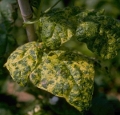| Description | Participants | Agenda | Summary | Products |
|---|
NIMBioS Investigative Workshop
Vectored Plant Viruses

Topic: Vector Transmission of Plant Viruses
Meeting dates: March 17-19, 2014
Location: NIMBioS at the University of Tennessee, Knoxville
Organizers:
Linda J. S. Allen, Mathematics and Statistics, Texas Tech Univ., Lubbock
Vrushali A. Bokil, Mathematics, Oregon State Univ., Corvallis
Elizabeth T. Borer, Ecology & Evolutionary Biology, Univ. of Minnesota, Minneapolis
Alison G. Power, Ecology & Evolutionary Biology, Cornell Univ., Ithaca, NY
Objectives. Plant viruses are among the greatest limiting factors to modern agriculture. Climate change and the emergence of new viral strains affect the health and biodiversity of crops and of plants in general, while the continued growth of the human population emphasizes the need for sustainable agriculture. This workshop will provide a forum for discussion of current problems on vectored transmission of plant viruses, with the goal of identifying mathematical, computational, and statistical methods, as well as insights derived using these methods. In addition, this workshop may lead to new collaborations and working groups on methods for prevention and control of vector transmission of plant viruses, which promote sustainable agricultural practices and reduce species invasions. The problems in vector transmission of plant viruses are not simple; they are multiscale and often are driven by data from specific crops or fields. This workshop will bring together experts in plant pathogens, agronomy, and vector and plant virology, physiology, and ecology with mathematical and statistical modelers to discuss problems in prevention and control of vector transmission of plant pathogens.
Some sample breakout sessions envisioned for this workshop include the following:
- Linking genomics and other molecular information to epidemiological dynamics
- Evolution of novel virus strains
- Modeling transmission mechanisms (climate effects, environmental determinants, coinfection)
- Epidemiological consequences of mode of virus transmission
- Spatial spread of vector-borne infection
- Reducing and controlling the rate of spread of emerging virus strains.
- Insect dispersal and vector behavior
Descriptive Flyer: PDF
Vectored Plant Viruses WordPress Site
Presentations were available for viewing via live streaming during the workshop.
 Summary Report.
In this investigative workshop, the organizers arranged for four presentations
given by Cherie Briggs, Lou Gross, Mike Jeger and Yang Kuang (three presentations are
available on the wordpress site). Based on participant input via the wordpress site, and input received
from participants during the workshop, the organizers identified four different topics related
to the workshop theme around which breakout sessions were organized. These four topics were: (1)
Evolution of virulence and resistance in vectored plant viruses, (2) Multi-scale modeling and heterogeneity
in plant disease epidemics, (3) Vector movement, and (4) Vector transmission in plants versus
animals. On each of the three days, participants chose one of the four breakout topics and formed
groups for more in-depth discussions. On the afternoons of Day 1 and Day 2, a representative from
each of the four breakout sessions gave a summary of the discussions to the entire group (reported
on the wordpress site). The breakout sessions resulted in one preliminary working group proposal
on vector movement to be submitted, and three papers in preparation on evolution of virulence,
multi-scale modeling and significance of vector transmission in plants.
Summary Report.
In this investigative workshop, the organizers arranged for four presentations
given by Cherie Briggs, Lou Gross, Mike Jeger and Yang Kuang (three presentations are
available on the wordpress site). Based on participant input via the wordpress site, and input received
from participants during the workshop, the organizers identified four different topics related
to the workshop theme around which breakout sessions were organized. These four topics were: (1)
Evolution of virulence and resistance in vectored plant viruses, (2) Multi-scale modeling and heterogeneity
in plant disease epidemics, (3) Vector movement, and (4) Vector transmission in plants versus
animals. On each of the three days, participants chose one of the four breakout topics and formed
groups for more in-depth discussions. On the afternoons of Day 1 and Day 2, a representative from
each of the four breakout sessions gave a summary of the discussions to the entire group (reported
on the wordpress site). The breakout sessions resulted in one preliminary working group proposal
on vector movement to be submitted, and three papers in preparation on evolution of virulence,
multi-scale modeling and significance of vector transmission in plants.
Products
Publications
Hamelin FM, Allen LJ, Prendeville HR, Hajimorad MR, Jeger MJ. 2016. The evolution of plant virus transmission pathways. Journal of Theoretical Biology. [Online]
NIMBioS Investigative Workshops focus on broad topics or a set of related topics, summarizing/synthesizing the state of the art and identifying future directions. Workshops have up to 35 participants. Organizers and key invited researchers make up half the participants; the remaining participants are filled through open application from the scientific community. Open applicants selected to attend are notified by NIMBioS within two weeks of the application deadline. Investigative Workshops have the potential for leading to one or more future Working Groups. Individuals with a strong interest in the topic, including post-docs and graduate students, are encouraged to apply. If needed, NIMBioS can provide support (travel, meals, lodging) for Workshop attendees, whether from a non-profit or for-profit organization.
A goal of NIMBioS is to enhance the cadre of researchers capable of interdisciplinary efforts across mathematics and biology. As part of this goal, NIMBioS is committed to promoting diversity in all its activities. Diversity is considered in all its aspects, social and scientific, including gender, ethnicity, scientific field, career stage, geography and type of home institution. Questions regarding diversity issues should be directed to diversity@nimbios.org. You can read more about our Diversity Plan on our NIMBioS Policies web page. The NIMBioS building is fully handicapped accessible.
NIMBioS
1122 Volunteer Blvd., Suite 106
University of Tennessee
Knoxville,
TN 37996-3410
PH: (865) 974-9334
FAX: (865) 974-9461
Contact NIMBioS


